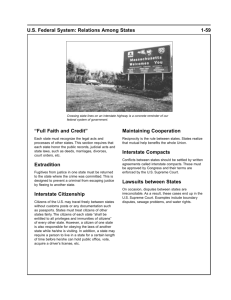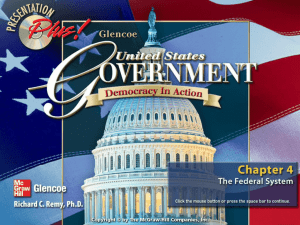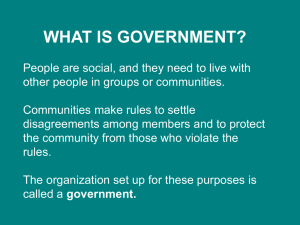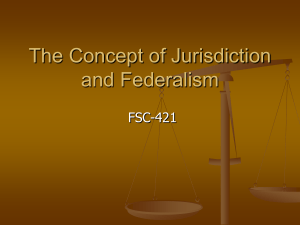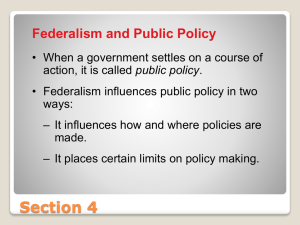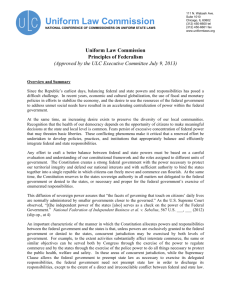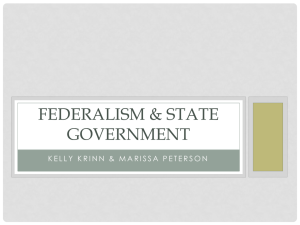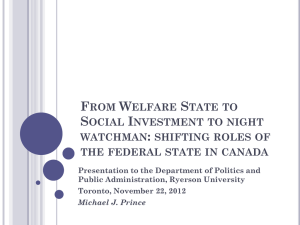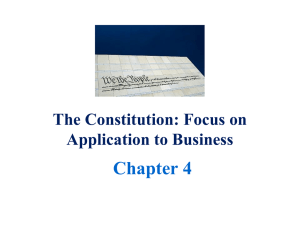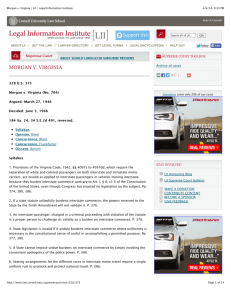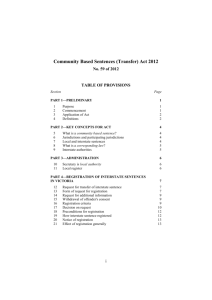Federalism - Michigan State University
advertisement
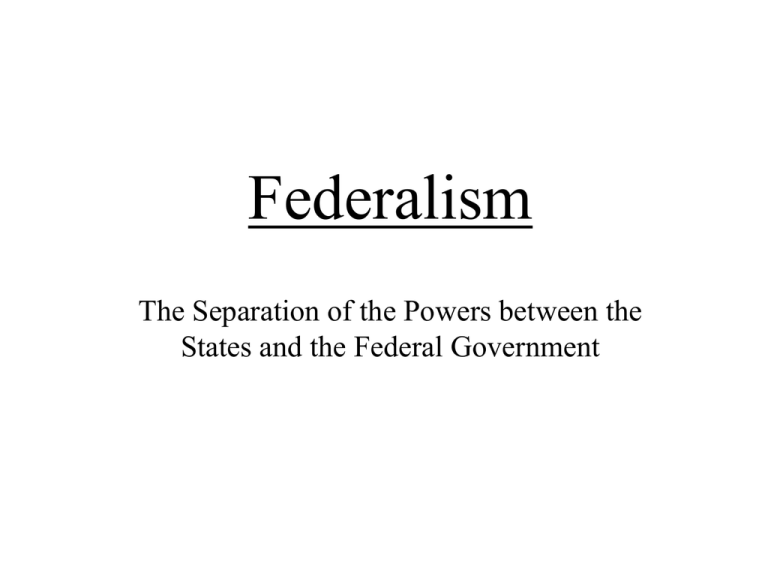
Federalism The Separation of the Powers between the States and the Federal Government Federalism • Federalism provides for a separation of powers between the state and federal governments • Framers of the Constitution rejected both a blind deference to states rights and a complete centralization of power within the federal government. • Individual states, when it adopted the Constitution and became a member of the United States, surrendered certain governmental powers to the Federal Government Federalism • States retain control over all legal issues not specifically delegated to the federal government • State ceded to the federal government supreme authority over national matters that concerned more than one state or the American people collectively • Federal Government can regulate local activity that substantially affects interstate commerce if national regulation is needed because states, on their own, could not achieve the same objective Federalism • Issues, such as education, family, or social matters, are retained by the states (10th Amendment) • The 10th amendment created an enclave of state autonomy that the federal government may not enter through exercise of legislative or regulatory power. Federalism • States are free to operate in any arena that has not been preempted by federal law • Federalism provides opportunities for expression of a wide range of conservative, moderate and liberal positions within a national forum • Separation of federal and state authority provides different groups with a stake in the political system and discourages separatist movements. Federalism • Legal activities of state governments, local governments and individuals can “do” is still constrained by the Constitution. The Constitution provides that the Laws of the United States shall be the supreme Law of the Land; and the Judges in every State shall be bound thereby. • State and federal governments can have power to pass legislation on the same subject • In the are of food safety regulation for example, states can issue regulations that may mirror those of the federal government. Federalism • States may pass additional, more restrictive or stringent food safety laws or regulations than those promulgated at the federal level • Federal government may delegate part of its authority to state agencies, such as permitting a state agency to conduct food plant safety inspections on its behalf Federalism Example • A small retailer in Cascadia bought a large bottle of nutritional supplements from an interstate wholesaler who had purchased them form an out of state supplier. • The bottle contained an unapproved food additive. The label form the manufacturer had clearly listed that this additive was present in the product. • The retailer transferred 12 pill to a smaller container and sold them in Cascadia. • He was charged with violating provisions of the federal Food, Drug and Cosmetics Act Holding: • Extension of federal jurisdiction to this apparently in-state matter is valid. • FDA’s role in promoting food and drug safety is national in scope. This permits the federal government to regulate entirely local sales of goods simply because they had crossed a single state line sometime during production and final sale. • Cumulative impact of countless individual sales of unapproved, and potentially unsafe, food additives in products sold in Cascadia, would diminish public confidence in the food industry in other states and would deter sales in these other states, creating a significant affect on interstate commerce Recent Example: • State of Ohio brings suit against USDA to challenge constitutionality of federal ban on interstate shipment of state-inspected meat • State says no “rational basis” for federal restriction b/c state inspection programs are certified as “at least equal to” federal program • So Federal restriction is violation of equal protection and commerce clause USDA Position • No way to know if state program truly functioning “at least equal to” federal program b/c of the way state program is monitored • USDA not required to rely on state’s “word” without federal oversight • No direct control of state-inspected meat Court • State inspected meat not subject to federal oversight • Subject is “life or death matter” • State programs examined only once in 4 years • American Meat Institute “Amicus Brief” – State meat plants can fall under federal program if want to so not discriminatory Separation of Powers • Federal Government divided into three branches: – Legislative – Executive – Judicial • Act as “checks and balances” to prevent any branch from dominating the government • States have same system Legislative Branch • Congress • Two houses – Senate – House of Representatives • “I’m just a bill” • Congress passes “laws” Executive Branch • President is head of Executive Branch • Enforces laws passed by the Legislature • Federal agencies who are created by congress through “enabling Legislation” • Agency heads serve at “the pleasure of president” • DOJ is only agency that can bring criminal charges Judicial Branch • Supreme and lower courts – Federal District Courts – Federal criminal cases – Courts of Appeal – Appeals from District Courts • Supreme Court hears only “certain” cases – Appeals from lower federal courts – State decisions regarding US Constitution – States vs. States Legal Mumbo Jumbo: • • • • • Regulation of Commerce Power to declare war Federal Preemption Federal Police Power Specialized Federal Courts: – Tax – Patents, Copyrights, Trademarks • Common Law / Natural Law Interstate Commerce • Congress’ power to regulate foods limited to foods that move in interstate commerce • Jurisdictional prerequisite • Interstate = between any State and anyplace outside thereof… • Commerce = any form of commercial activity involving goods Example: • Michiganer goes to Wisconsin, buys cheese for personal consumption and returns to Mich. • Wis. seller had no reason to know Michiganer returning to Mich. with cheese • This NOT interstate commerce b/c: – Wis. seller didn’t know – Mich. Buyer did not resell cheese, personal use

